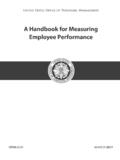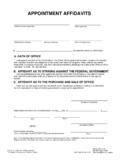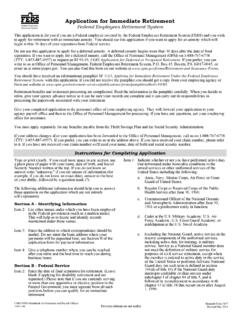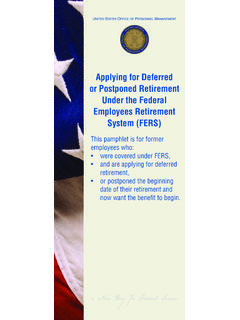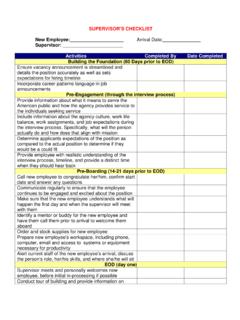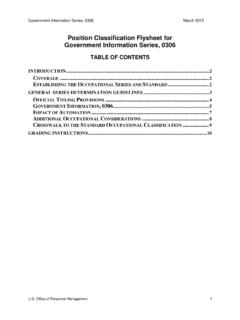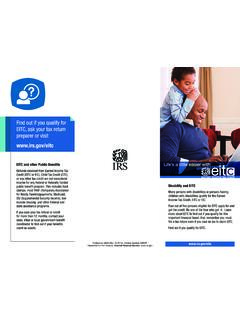Transcription of MANAGING FEDERAL EMPLOYEES’ PERFORMANCE ISSUES OR …
1 MANAGING FEDERAL EMPLOYEES PERFORMANCE ISSUES OR MISCONDUCT 1 Overview: One of the biggest challenges facing FEDERAL sector managers and supervisors is taking swift action to manage employees who are not meeting PERFORMANCE expectations and not contributing to agency goals. Managers and supervisors may not be making full use of the many options to deal with employees with PERFORMANCE or conduct ISSUES . Managers and supervisors may take actions against employees, up to and including removal from FEDERAL employment, for job PERFORMANCE deficiencies and/or misconduct. This guidance provides agency human resources offices, managers, and supervisors with a broad overview of the different tools that can be used to manage employees job PERFORMANCE and address unacceptable PERFORMANCE or misconduct.
2 This overview of authorities under title 5, United States Code, is not meant to be a comprehensive guide that addresses every possible incident of misconduct or PERFORMANCE problems as each situation will vary depending on the facts involved. Also, individual agencies may have unique statutory authorities and guidelines for addressing misconduct or PERFORMANCE problems. However, it does highlight the tools generally available to Executive Branch managers and supervisors for addressing misconduct or PERFORMANCE problems. You should consult with your human resources office to determine which tools are applicable to your agency.
3 This guidance addresses both members of the Senior Executive Service (SES) and non-SES FEDERAL employees. For employees who are covered by bargaining units, negotiated agreements with the applicable labor unions may contain time limits or other procedures that should be followed when taking action regarding bargaining unit employees, but these procedures must be consistent with the requirements of Title 5, United States Code. Actions That Can Be Taken to Avoid PERFORMANCE or Conduct ISSUES : The best way for managers and supervisors to handle PERFORMANCE and conduct ISSUES is to take action to avoid PERFORMANCE problems or conduct ISSUES before they occur.
4 Such preventive actions include, but are not limited to: Communicate clear PERFORMANCE standards and expectations to employees. If your employees do not understand what is expected, it will be very hard, if not impossible, for them to meet those expectations. Providing clear expectations does not necessarily require you to lay out precisely written, detailed instructions on every PERFORMANCE component but should provide expectations with enough clarity and specificity so that employees understand their responsibilities and can be held accountable for them. Generally, the question you should ask in drafting PERFORMANCE standards: Would a reasonable person understand what was expected?
5 Provide regular and consistent feedback on PERFORMANCE . Such feedback, both positive and corrective, whether given in regularly scheduled meetings or in unscheduled discussions, is crucial to ensuring that expectations are understood. MANAGING FEDERAL EMPLOYEES PERFORMANCE ISSUES OR MISCONDUCT 2 Consistent feedback lessens the likelihood that an employee will be surprised if it becomes necessary to take formal steps to resolve unacceptable PERFORMANCE . Always look for opportunities to confirm that your employees understand what is expected. Reward and recognize good PERFORMANCE , informally and formally.
6 Recognizing good PERFORMANCE is simply another way to clarify and reinforce expectations. Recognizing good PERFORMANCE boosts morale and also increases the likelihood that good PERFORMANCE will continue. Make full use of the probationary period for employees. PERFORMANCE problems often first show up during the initial period of Government employment. This period is designed to provide an opportunity for managers and supervisors to address such problems in an expedient manner. Furthermore, removing probationary employees based on conduct and PERFORMANCE ISSUES is less cumbersome as they are not entitled to most of the procedures and appeal rights granted to employees who have completed probationary/trial periods.
7 More information on the probationary or trial period is discussed in more detail later in this guide. Set the desired example by the manager s or supervisor s own conduct. Employees often follow the lead of their managers and supervisors. Demonstrating leadership through clear communication, taking initiative and being inclusive can set the tone for an office. Maintain a good work atmosphere. Creating inclusive work environments where the workforce is fully engaged can be a critical enabler of organizational success and PERFORMANCE . Assure that employees conform to any applicable standards of conduct.
8 Public service is a public trust. To ensure that every citizen can have complete confidence in the integrity of the FEDERAL Government, FEDERAL employees are expected to adhere to certain principles of ethical Additionally, FEDERAL employees are expected to conform to standards of conduct established by Government-wide and agency policies. 2 Maintain effective lines of communication with the Human Resources Office and Agency Legal Office. While managers and supervisors are ultimately responsible for addressing PERFORMANCE and misconduct problems, they are not expected to be subject matter experts on application of the tools discussed in this guidance.
9 The Human Resources Office and Agency Legal Office are available to advise, assist and guide managers and supervisors through the available processes for addressing PERFORMANCE and conduct ISSUES . 1 See 5 Part 2635. 2 See 5 Part 735. MANAGING FEDERAL EMPLOYEES PERFORMANCE ISSUES OR MISCONDUCT 3 Addressing PERFORMANCE or Conduct ISSUES of Non-SES Employees during the Probationary Period: Employees newly hired into the FEDERAL Government and into a competitive service position are generally required to serve a 1-year probationary The probationary period is an important management tool to evaluate the conduct and PERFORMANCE of an employee and should be treated as the last step in the hiring process.
10 Appropriate actions taken within the probationary period are the best way to avoid long-term problems. Employees may be terminated from employment during the probationary period for pre-employment reasons or for unacceptable PERFORMANCE or When removal is based on pre-employment ISSUES , the employee is given advance notice, an opportunity to provide an explanation of the events related to pre-employment ISSUES and an agency When the basis for termination is unacceptable PERFORMANCE or conduct, advance notice of the intent to terminate is not required. However, the employee must be informed in writing of the reason for the summary termination.
